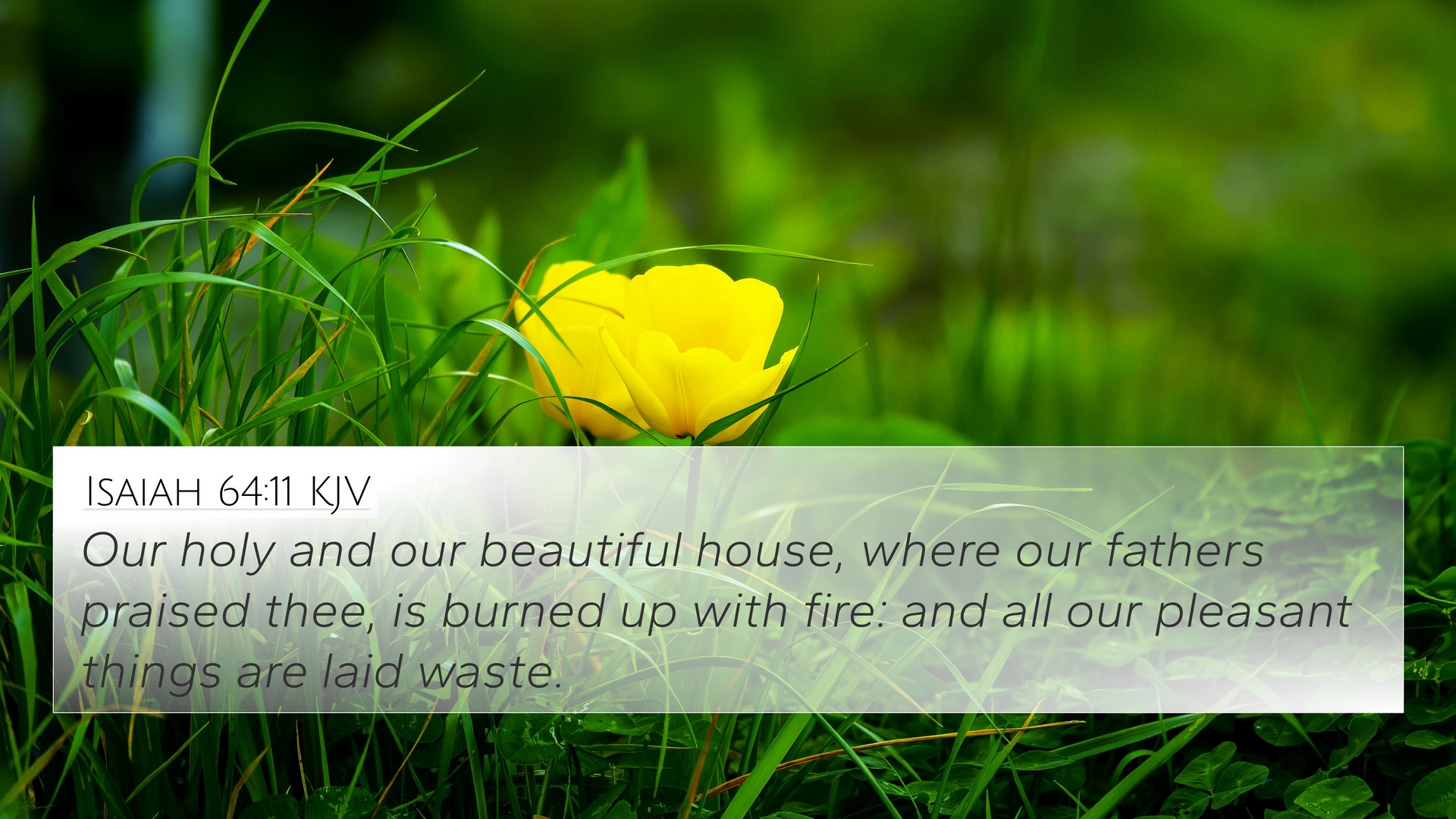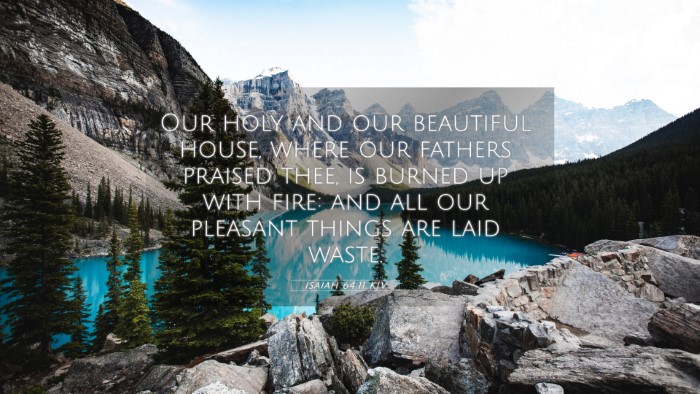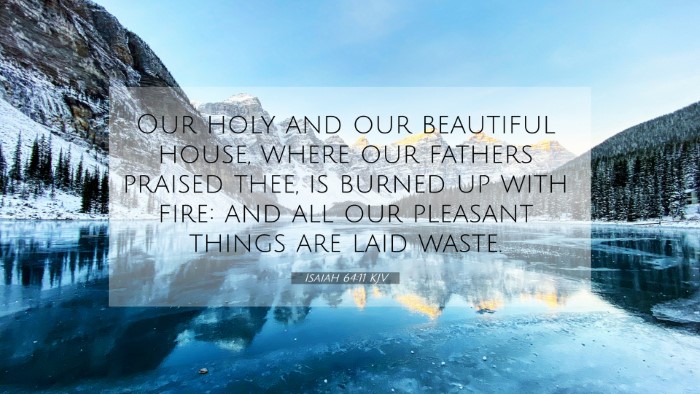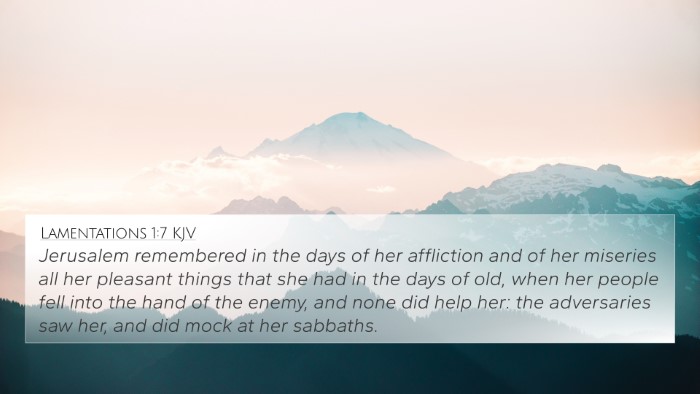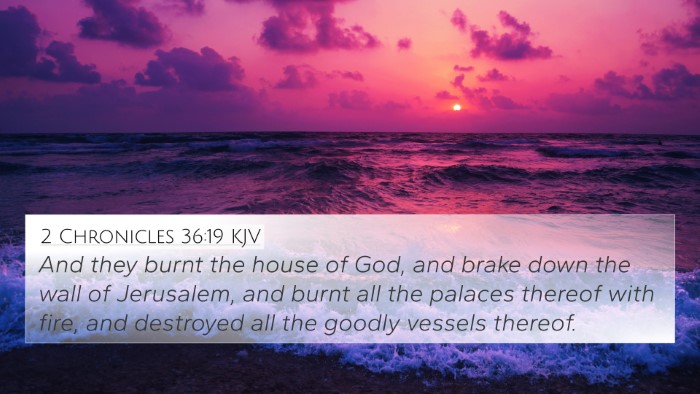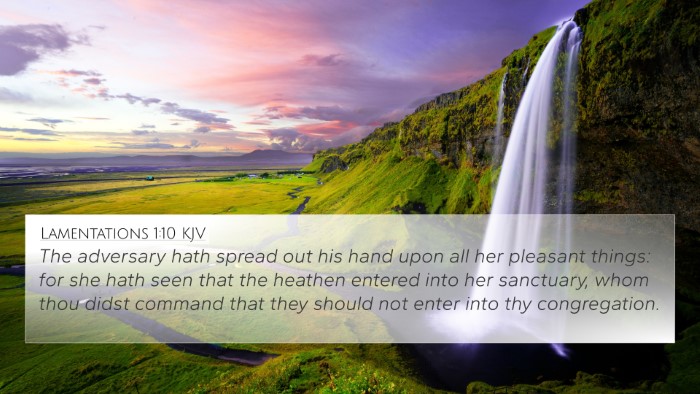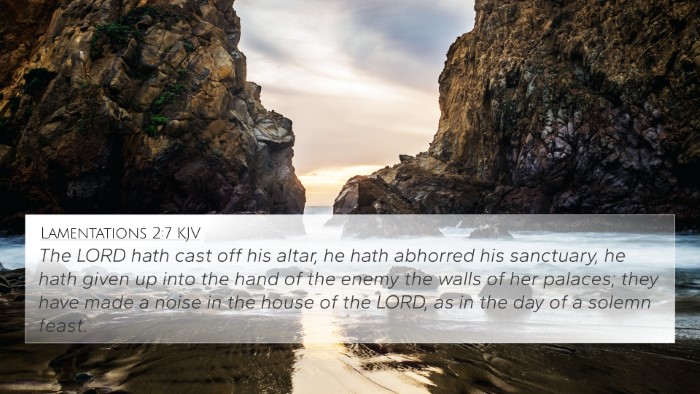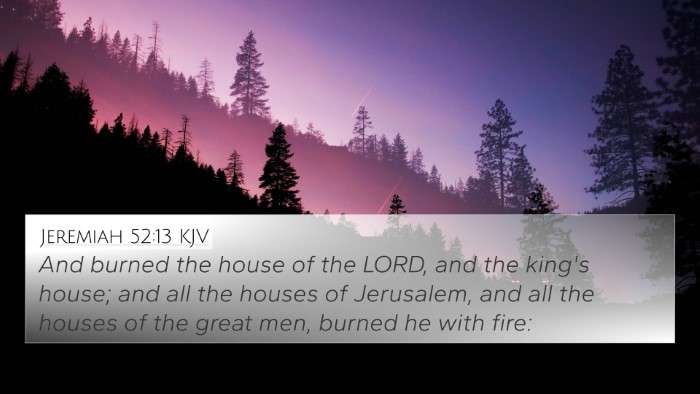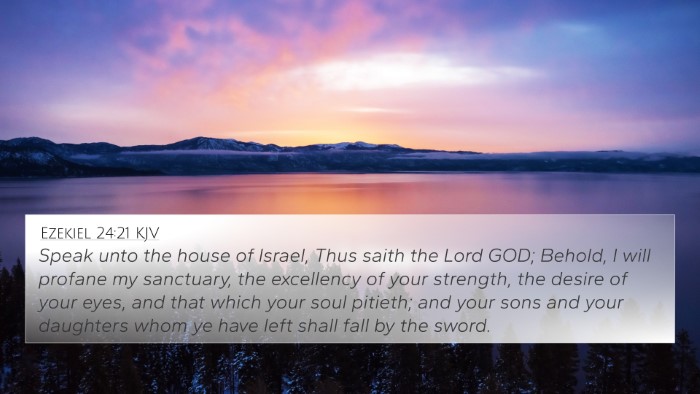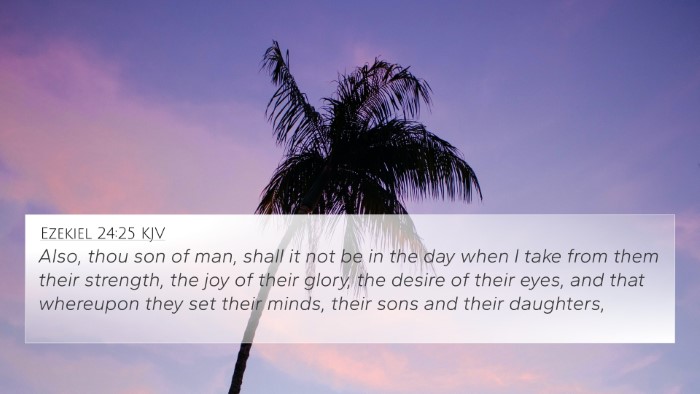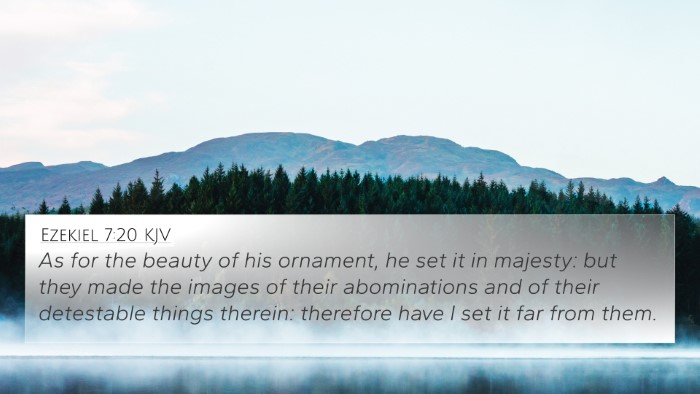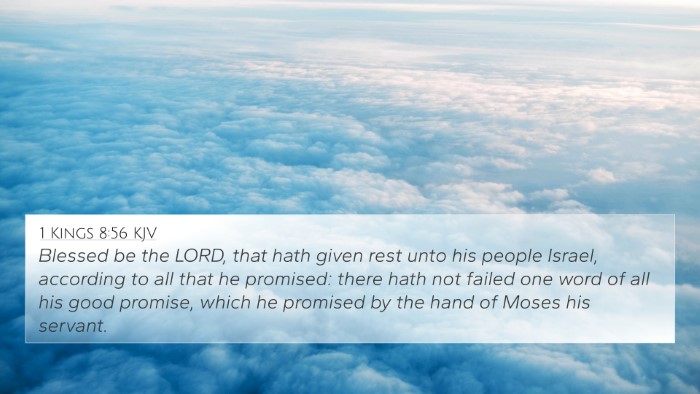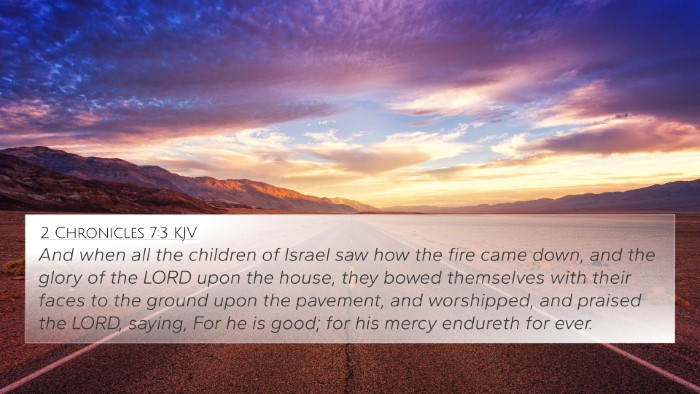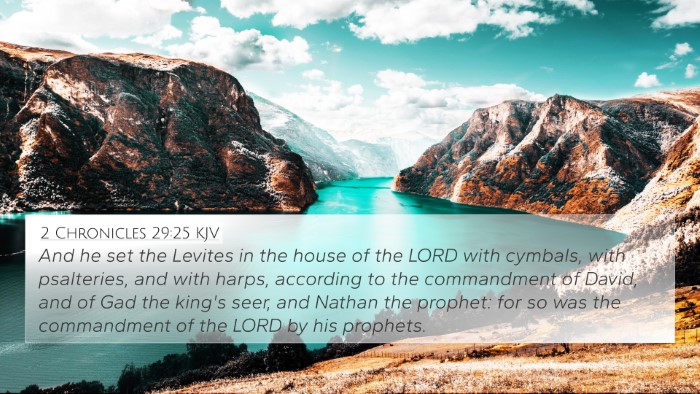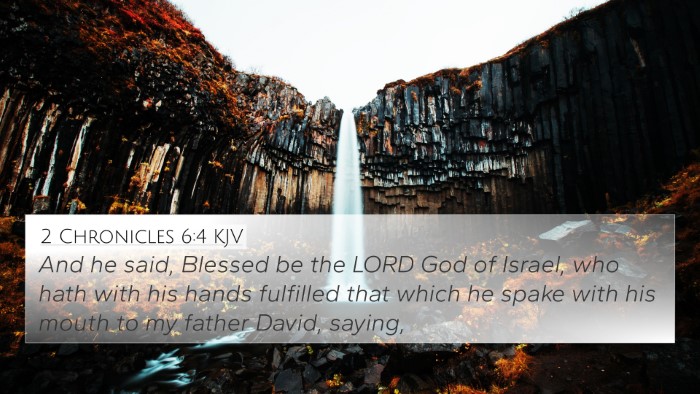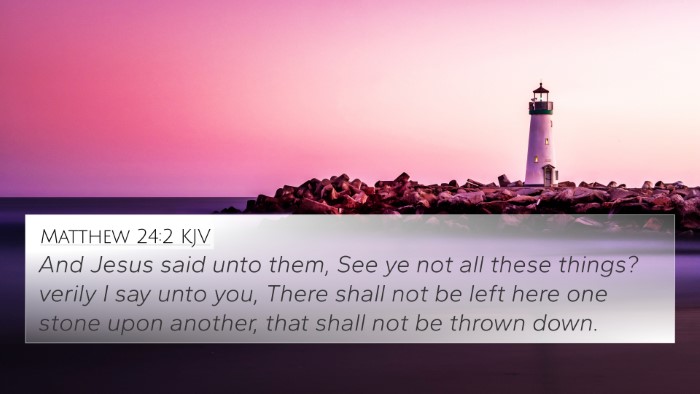Understanding Isaiah 64:11
Isaiah 64:11 states, "Our holy and beautiful house, where our fathers praised You, is burned up with fire; and all that is pleasant is laid waste." This verse is significant as it reflects the sorrow and devastation experienced by the people of Israel. Below, we explore its meaning through insights drawn from several public domain commentaries, including those of Matthew Henry, Albert Barnes, and Adam Clarke. This comprehensive analysis will incorporate relevant cross-references from the Bible to enhance understanding.
Commentary Insights
Matthew Henry's Commentary
Matthew Henry highlights the lament in this verse as the people mourn over the destruction of the temple, the place where they worshiped God. He emphasizes the spiritual significance of the temple to the families of Israel and recognizes the connection between physical destruction and spiritual desolation. The verse showcases the need for repentance and a return to God amidst adversity.
Albert Barnes' Notes
Albert Barnes adds that Isaiah 64:11 not only captures the state of the temple's physical destruction but also serves as a reminder of God’s displeasure due to Israel's sins. He points out that the temple was a symbol of God's presence, and its destruction implied a withdrawal of His favor. Barnes also underscores that this mourning must lead to a seeking after God's forgiveness and restoration.
Adam Clarke's Commentary
Adam Clarke discusses the historical context of this verse, addressing the mourning of the Israelites after the Babylonian exile. He explains that the temple's destruction reflected a broader spiritual decay among the people. Clarke suggests that the term "holy and beautiful house" indicates not only physical beauty but spiritual significance, illustrating how deeply intertwined their identity was with their place of worship.
Thematic Connections
Thematically, Isaiah 64:11 touches on the concepts of loss, mourning, and the need for restoration. It is crucial to connect this verse with others in the Bible that reflect similar themes and sentiments.
Bible Cross References
- Psalm 74:3 - "Lift up Your feet to the perpetual desolations; The enemy has damaged everything in the sanctuary."
- Lamentations 1:10 - "The adversary has spread his hand over all her pleasant things; For she has seen the nations enter her sanctuary, Those whom You commanded Not to enter Your assembly."
- Jeremiah 7:14 - "Therefore, I will do to the house which is called by My name, in which you trust, and to the place which I gave to you and your fathers, as I did to Shiloh."
- Ezekiel 7:22 - "My face will turn from them, and I will not look at them anymore; They have profaned My secret place; For the robbers shall enter it and profane it."
- Matthew 24:1-2 - "Then Jesus went out and departed from the temple, and His disciples came up to show Him the buildings of the temple. And Jesus said to them, 'Do you not see all these things?'"
- Hebrews 9:11-12 - "But Christ came as High Priest of the good things to come, with the greater and more perfect tabernacle not made with hands, that is, not of this creation. Not with the blood of goats and calves, but with His own blood He entered the Most Holy Place once for all, having obtained eternal redemption."
- Revelation 21:3 - "'And I heard a loud voice from heaven saying, 'Behold, the tabernacle of God is with men, and He will dwell with them, and they shall be His people. God Himself will be with them and be their God.'"
Analyzing the Cross-References
The connections uncovered through these cross-references exhibit the overarching narrative of God’s relationship with His people, emphasizing themes of loss, promise, and eventual restoration. Here’s a brief analysis of how these verses connect:
- Loss of Sanctuary: Both Psalm 74:3 and Lamentations 1:10 echo the grief over a sanctified space that has been desecrated, similar to the anguish expressed in Isaiah 64:11.
- Divine Judgment: Jeremiah 7:14 showcases the consequences of turning away from God, paralleling the themes found in Isaiah where destruction is depicted as a result of Israel's sin.
- Presence of God: In Matthew 24:1-2, Jesus’s prophecy concerning the temple serves as a foreshadowing of its destruction, linking to the loss described in Isaiah 64:11.
- New Covenant Hope: The hope found in Hebrews 9:11-12 and Revelation 21:3 contrasts with the mourning in Isaiah, showing ultimately that God's presence will dwell among His people beyond physical structures.
Tools for Bible Cross-Referencing
For those seeking to delve deeper into the connections between scriptures, various tools can aid in effective Bible cross-referencing:
- Bible Concordance: A useful resource for finding specific verses and themes within the Bible.
- Bible Cross-Reference Guide: Guides that illustrate how different scriptures relate to one another.
- Bible Reference Resources: Compilation of tools and references for comprehensive Bible study.
- Bible Chain References: Systems that link related verses, aiding in thematic studies.
Conclusion
Isaiah 64:11 serves as a poignant reminder of the relationship between God and His people, emphasizing the consequences of spiritual neglect and the hope for restoration. By utilizing cross-references, one can gain a fuller understanding of biblical themes, witness how scripture interacts across the testaments, and deepen one’s spiritual insights.
Further Exploration
As you continue your journey through the scriptures, consider how to identify connections between Old and New Testament writings, as well as exploring the thematic undercurrents that run throughout the Bible. Understanding these links enhances scripture interpretation and enriches one's faith journey.
